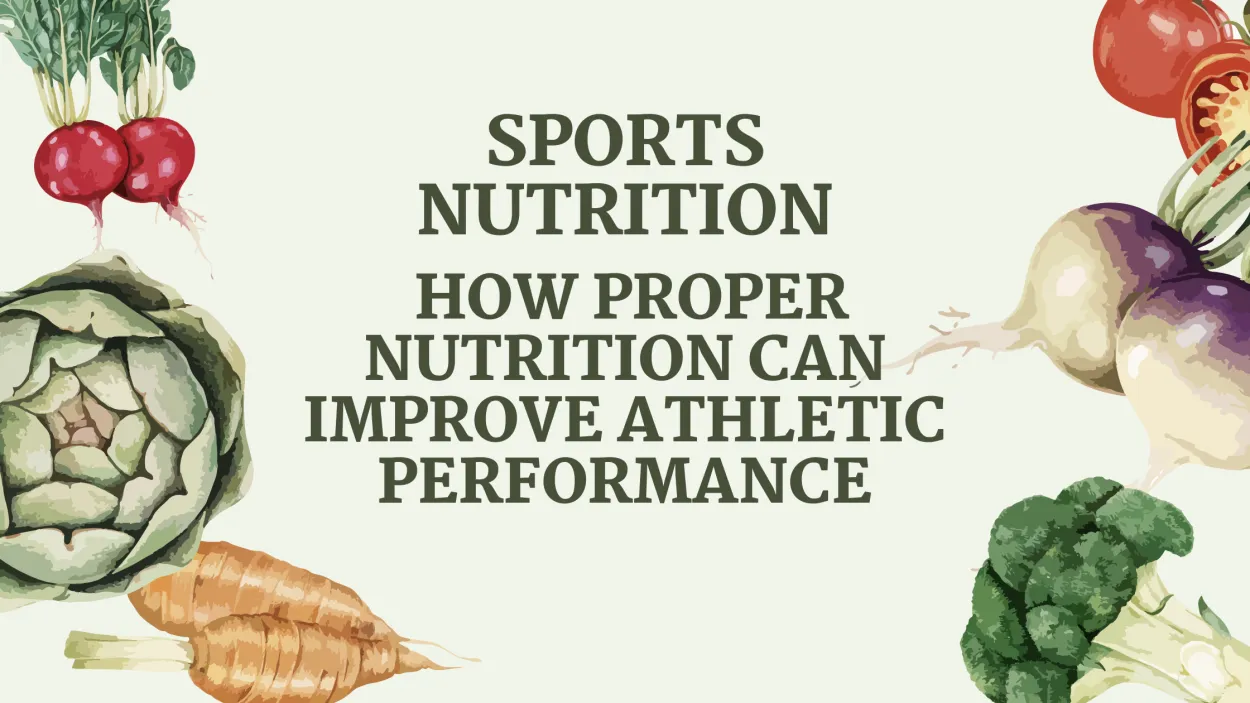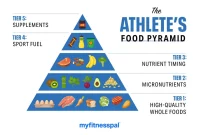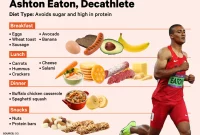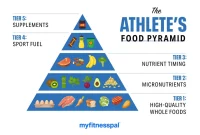Nutritional strategies play a crucial role in enhancing athletic performance. From fueling workouts to optimizing recovery, the right balance of nutrients can make all the difference in achieving athletic success. In this article, we will explore the key nutritional strategies that athletes can employ to maximize their performance and achieve their goals.
The Basics of Sports Nutrition
Sports nutrition plays a vital role in the success of athletes. Proper nutrition not only fuels the body but also enhances performance, facilitates recovery, and reduces the risk of injuries. Here are some essential principles to keep in mind when it comes to sports nutrition:
1. Balanced Macronutrients
Athletes should focus on consuming a well-balanced diet that includes carbohydrates, proteins, and fats. Carbohydrates provide energy for exercise, while proteins aid in muscle repair and growth. Fats contribute to overall health and help with hormone production.
2. Hydration is Key
Staying properly hydrated is crucial for athletes. Dehydration can lead to fatigue, decreased performance, and even heat-related illnesses. It is recommended to drink water regularly throughout the day and increase fluid intake during workouts or competitive events.
3. Timing and Pre-Workout Nutrition
Eating the right foods before training or competing is essential. Pre-workout meals should be consumed 1-3 hours beforehand and contain easily digestible carbohydrates and a moderate amount of protein. This combination provides a steady source of energy.
4. Recovery Nutrition
After intense exercise, proper recovery nutrition helps replenish glycogen stores, repair muscles, and reduce inflammation. Consuming a snack or meal within 30 minutes to 2 hours post-workout, consisting of carbohydrates and protein, can optimize recovery.
5. Sports-Specific Considerations
Different sports have different nutritional demands. Sports that require endurance, such as long-distance running, may require additional carbohydrates for sustained energy. Activities that focus on strength and power, such as weightlifting, may benefit from higher protein intake to support muscle building.
Remember, sports nutrition is highly individualized, and it’s important for athletes to work with a qualified sports dietitian to develop personalized strategies that suit their specific needs and training goals.
Customizing Your Diet for Specific Sports
When it comes to athletic success, nutrition plays a crucial role. Each sport requires different physical demands and energy expenditure, making it essential to customize your diet accordingly. By tailoring your nutrition plan to your sport, you can optimize performance, support recovery, and prevent injuries. Here are some key guidelines for customizing your diet:
1. Understand your sport’s energy demands
Start by understanding the energy requirements of your specific sport. Endurance-based activities like long-distance running or cycling require a high intake of carbohydrates to fuel sustained performance. In contrast, strength-based sports like weightlifting or sprinting may require a higher intake of protein for muscle recovery and development.
2. Prioritize macronutrients
Macronutrients – carbohydrates, proteins, and fats – form the foundation of any athlete’s diet. However, the proportions of these nutrients may vary depending on your sport. For example, endurance athletes may benefit from a higher carbohydrate intake, while those in power sports might focus more on protein and healthy fats.
3. Timing is crucial
The timing of your meals and snacks can impact performance and recovery. To fuel your workouts, consume a balanced meal that includes carbohydrates and proteins a few hours before your training session or competition. Afterwards, replenish your energy stores by eating a mix of carbohydrates and proteins within 30 minutes to an hour after exercise.
4. Hydration matters
Proper hydration is vital for optimal performance. Each sport has different fluid needs, depending on the intensity, duration, and environmental conditions. It’s essential to stay hydrated throughout the day, especially during training or competitions, by drinking water, sports drinks, or electrolyte-rich fluids.
5. Individualize your plan
Remember that each athlete has unique dietary requirements. Factors such as body composition, metabolism, and health conditions should also be taken into account when customizing your diet. Consider seeking guidance from a sports nutritionist who can help you create a personalized nutrition plan.
The Truth About Carbohydrate Loading
Carbohydrate loading, also known as glycogen loading, is a technique commonly used by athletes to maximize their glycogen stores before an endurance event. However, there are some misconceptions and important considerations to keep in mind when it comes to this practice.
1. Timing is key
Carbohydrate loading should be done strategically and not excessively. It is recommended to begin the process 2-3 days before the event to allow sufficient time for the body to store glycogen.
2. The right balance
A common mistake is consuming excessively high amounts of carbohydrates without considering the other macronutrients. Remember to maintain a balanced diet with adequate protein and healthy fats, as they are also crucial for athletic performance.
3. Know your needs
Each individual has different carbohydrate requirements. Factors such as body weight, training intensity, and duration should be considered when determining the appropriate amount of carbohydrates to consume during the loading phase.
4. Practice makes perfect
It is crucial to test and fine-tune your carbohydrate loading strategy during training. This helps you determine the perfect amount and timing that works best for your body.
5. Stay hydrated
Proper hydration is essential for carbohydrate loading to be effective. Remember to drink enough fluids, especially during the loading phase, to maintain optimal performance and prevent dehydration.
6. Consider potential drawbacks
Carbohydrate loading may not be suitable for every athlete. Individuals with specific dietary restrictions or gastrointestinal issues should consult a healthcare professional before adopting this strategy.
In conclusion, carbohydrate loading can be a valuable tool for athletes aiming to optimize their performance. By understanding the key principles and tailoring the approach to individual needs, athletes can effectively utilize carbohydrate loading to their advantage.
Protein Intake for Muscle Recovery
When it comes to athletic success, proper nutrition plays a crucial role. One key aspect that athletes should pay close attention to is their protein intake. Protein acts as the building blocks for muscle growth and repair, making it essential for promoting optimal muscle recovery.
During intense physical activity, the muscles experience small tears and damage. Consuming an adequate amount of protein post-workout helps to repair and rebuild these damaged muscles, leading to faster recovery and improved overall performance.
The recommended daily protein intake varies depending on the individual’s body weight and activity level. However, a general guideline suggested by experts is to consume around 0.8 to 1 gram of protein per kilogram of body weight. Athletes engaging in highly strenuous activities may require even higher protein intake.
It is important to distribute protein intake evenly throughout the day, including both meals and snacks. This allows for a steady supply of amino acids, which are the building blocks of protein, to the muscles. Examples of protein-rich foods include lean meats, poultry, fish, eggs, dairy products, legumes, and plant-based protein sources such as tofu and tempeh.
Athletes should also consider the timing of their protein intake. Consuming protein within 30 minutes to one hour after a workout is beneficial for optimal muscle recovery. This is because the muscles are most receptive to nutrient absorption during this period, known as the “anabolic window.”
In addition to protein, athletes should ensure they are getting a well-rounded diet that includes carbohydrates for energy and fats for overall health. Hydration is also crucial, as it aids in nutrient absorption and helps to prevent muscle cramps and fatigue.
The Role of Fats in an Athlete’s Diet
Fats play a crucial role in the diet of an athlete, providing energy, supporting hormone production, and aiding in the absorption of fat-soluble vitamins. While often demonized, fats are an essential macronutrient that should not be excluded from an athlete’s nutrition plan.
One important function of fats is their energy contribution. They are a concentrated source of calories, providing more than double the energy per gram compared to carbohydrates and proteins. This makes fats especially valuable for athletes who engage in endurance activities and require sustained energy release.
Fats also serve as a carrier for essential fat-soluble vitamins, including vitamins A, D, E, and K. These vitamins are important for various physiological processes such as bone health, immune function, and antioxidant protection. Consuming adequate amounts of healthy fats helps ensure the proper absorption of these vital nutrients.
In addition, fats are involved in the production of hormones, particularly steroid hormones such as testosterone. These hormones play a critical role in muscle growth, repair, and overall athletic performance. By incorporating healthy fats into their diet, athletes can support hormonal balance and optimize their training outcomes.
It is important for athletes to focus on consuming healthy fats rather than unhealthy saturated or trans fats. Healthy fats can be found in foods such as avocados, nuts and seeds, fatty fish like salmon, and olive oil. These sources provide essential fatty acids, such as omega-3 and omega-6, which have anti-inflammatory properties and contribute to overall cardiovascular health.
In conclusion, fats are a vital component of an athlete’s diet. They provide energy, aid in the absorption of essential vitamins, and support hormone production. By including healthy fats in their nutrition plan, athletes can optimize their performance, enhance recovery, and maintain overall health.
Conclusion
In conclusion, implementing proper nutritional strategies is crucial for achieving athletic success. Adequate caloric intake, balanced macronutrient distribution, and optimal hydration are key factors for peak performance. Additionally, focusing on nutrient timing, individualized meal plans, and supplementation can further enhance athletic gains. By prioritizing nutrition, athletes can optimize their training, recovery, and overall performance.




